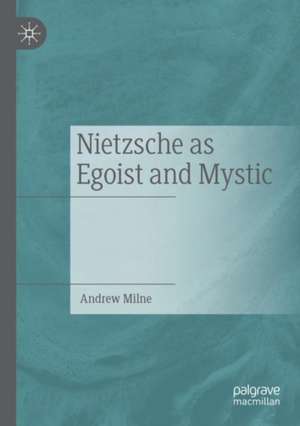Nietzsche as Egoist and Mystic
Autor Andrew Milneen Limba Engleză Paperback – 21 aug 2022
| Toate formatele și edițiile | Preț | Express |
|---|---|---|
| Paperback (1) | 722.55 lei 6-8 săpt. | |
| Springer International Publishing – 21 aug 2022 | 722.55 lei 6-8 săpt. | |
| Hardback (1) | 726.82 lei 6-8 săpt. | |
| Springer International Publishing – 20 aug 2021 | 726.82 lei 6-8 săpt. |
Preț: 722.55 lei
Preț vechi: 881.15 lei
-18% Nou
Puncte Express: 1084
Preț estimativ în valută:
138.28€ • 142.85$ • 115.08£
138.28€ • 142.85$ • 115.08£
Carte tipărită la comandă
Livrare economică 26 martie-09 aprilie
Preluare comenzi: 021 569.72.76
Specificații
ISBN-13: 9783030750091
ISBN-10: 3030750094
Ilustrații: XIII, 207 p.
Dimensiuni: 148 x 210 mm
Greutate: 0.3 kg
Ediția:1st ed. 2021
Editura: Springer International Publishing
Colecția Palgrave Macmillan
Locul publicării:Cham, Switzerland
ISBN-10: 3030750094
Ilustrații: XIII, 207 p.
Dimensiuni: 148 x 210 mm
Greutate: 0.3 kg
Ediția:1st ed. 2021
Editura: Springer International Publishing
Colecția Palgrave Macmillan
Locul publicării:Cham, Switzerland
Cuprins
Chapter 1:The Sanctification of Nietzsche.- Chapter 2: Ancestors, Part I: Goethe.-Chapter 3: Ancestors, Part II: Heraclitus, Empedocles, Spinoza.- Chapter 4: Mysticism from Birth to Breakdown.- Chapter 5: Against Mediation.- Chapter 6: The Great Hospital.- Chapter 7: On Being Enamoured.- Chapter 8: Hafez Shrugs the Cloak.
Notă biografică
Andrew Milne teaches philosophy at the University of Western Australia. His primary research interests are in Aesthetics and the Comparative Philosophy of Religion.
Textul de pe ultima copertă
This book is an attempt to make sense of the tension in Nietzsche’s work between the unashamedly egocentric and the apparently mystical. While scholars have tended to downplay one or other of these aspects, it is the author’s contention that the two are not only compatible but mutually illuminating. This book demonstrates Nietzsche’s sustained interest in mysticism from the time of The Birth of Tragedy right through to the end of his productive life. This book argues against situating Nietzsche’s religious thought in the context of Buddhist or Christian mystical traditions, demonstrating the inadequacy of attempts to mediate between Nietzsche and Meister Eckhart and the Bodhisattva ideal of Mahayana Buddhism. Rather, it is argued that Nietzsche’s egoism and mysticism are best understood in the intellectual context which he himself avowed, according to which his “ancestors” were Heraclitus, Empedocles, Spinoza, and Goethe.
Caracteristici
Seeks to resolve the tension in Nietzsche’s work between the unashamedly egocentric and the apparently mystical Focusses on Nietzsche's 'ancestors' to illuminate his thought Demonstrates Nietzsche’s sustained interest in mystical experience throughout his philosophical career
